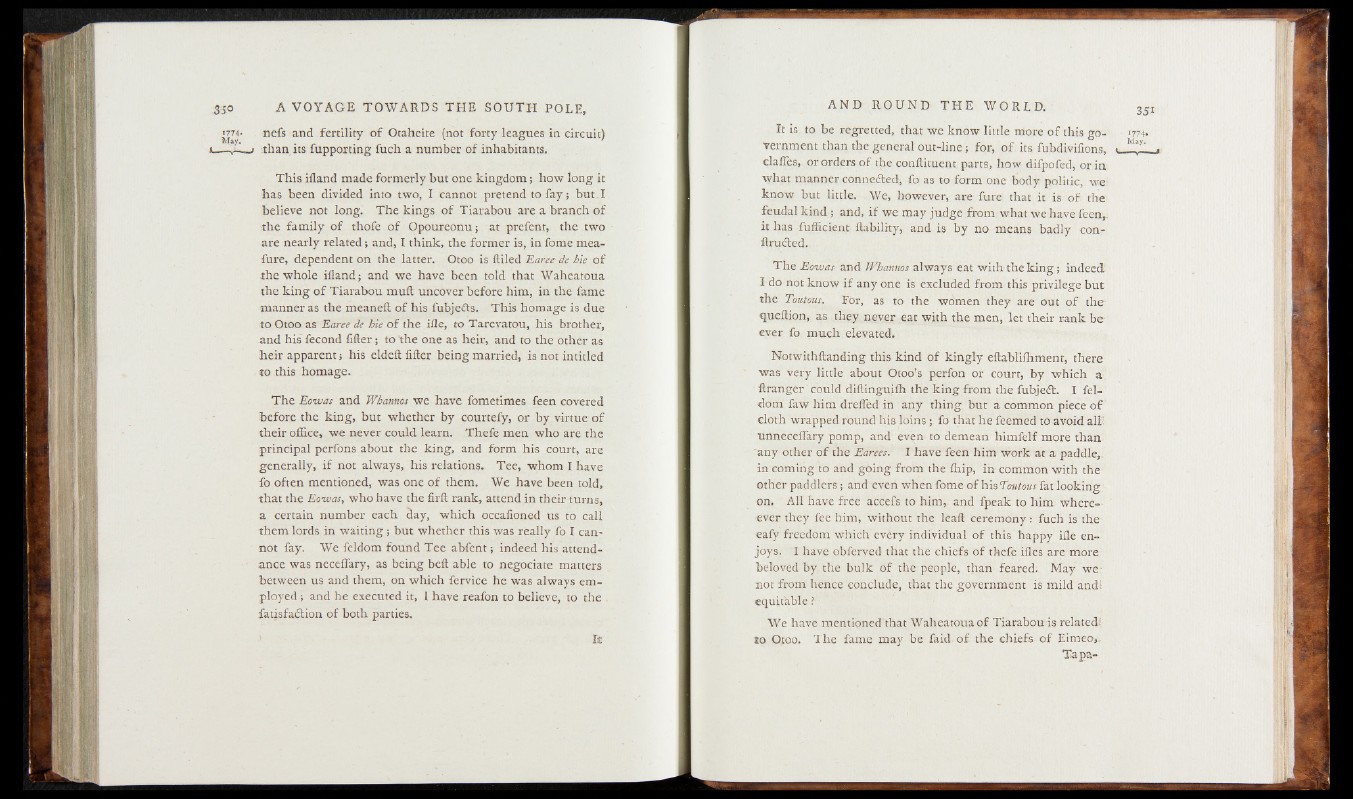
nefs and fertility of Otaheite (not forty leagues in circuit)
than its fupporting fuch a number of inhabitants.
This ifland made formerly but one kingdom; how long it
has been divided into two, I cannot pretend to fay; but.I
believe not long. The kings of Tiarabou are a branch of
the family of thofe of Opoureonu; at prefent, the two
are nearly related; and, I think, the former is, in fome mea-
fure, dependent on the latter. Otoo is ftiled Earee de hie of
the whole ifland; and we have been told that Waheatoua
the king of Tiarabou muft uncover before him, in the fame
manner as the meaneft of his fubjefts. This homage is due
to Otoo as Earee de hie of the ifle, to Tarevatou, his brother,
and his fecond After; to the one as heir, and to the other as
heir apparent; his eldeft After being married, is not intitled
to this homage.
The Eouuas and Wharnos we have fometimes feen covered
before the king, but whether by courtefy, or by virtue of
their office, we never could learn. Thefe men who are the
principal perfons about the king, and form his court, are
generally, if not always, his relations. Tee, whom I have
fo often mentioned, was one of them. We have been told,
that the Eoivas, who have the firft rank, attend in their turns,
a certain number each day, which occafioned us to call
them lords in waiting ; but whether this was really fo I cannot
fay. We feldom found Tee abfent; indeed his attendance
was neceflary, as being beft able to negociate matters
between us and them, on which fervice he was always employed
; and he executed it, 1 have reafon to believe, to the
fatisfadtion of both parties.
It
It is to be regretted, that we know little more of this government
than the general out-line; for, of its fubdivifions,
dalles, or orders of the conftituent parts, how difpofed, or in
what manner connedted, fo as to form one body politic, we
know but little. We, however, are fure that it is of the
feudal kind ; and, if we may judge from what we have feen,
it has fufficient liability, and is by no means badly con-
ftrudted.
The Eowas and Whannos always eat with the king; indeed
I do not know if any one is excluded from this privilege but
the Toutous. For, as to the women they are out of the
queftion, as they never eat with the men, let their rank be
ever fo much elevated.
Notwithftanding this kind of kingly eftablilhmenr, there
was very little about Otoo’s perfon or court, by which a
ftranger could diftinguifli the king from the fubjedt. I feldom
faw him drefled in any thing but a common piece of
cloth wrapped round his loins ; fo that he feemed to avoid alii
unnecefiary pomp, and even to demean himfelf more than
any other of the E a rns . I have feen him work at a paddle,
in coming to and going from the fliip, in common with the
other paddlers ; and even when fome of his Toutous fat looking
on. All have free accefs to him, and fpeak to him where-
ever they fee him, without the leaft ceremony: fuch is the
eafy freedom which every individual of this happy ifle enjoys.
I have obferved that the chiefs of thefe ifles are more
beloved by the bulk of the people, than feared. May we-
not from hence conclude, that the government is mild andi
equithble
We have mentioned'that Waheatoua of Tiarabou is related:
to Otoo. The fame may be faid of the chiefs of Eimeo,,
Tapa